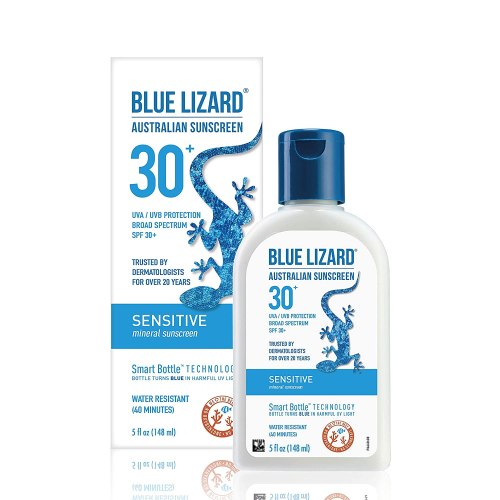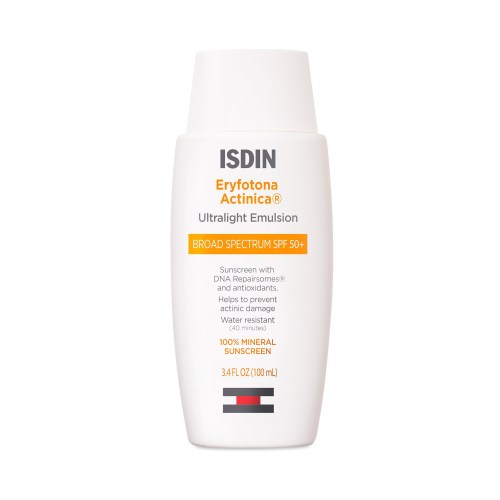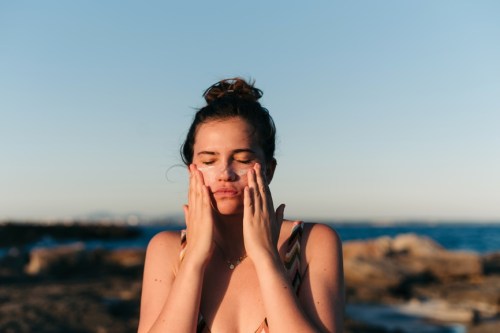Our editors independently select these products. Making a purchase through our links may earn Well+Good a commission
Sunscreen regulations in the United States have been at a standstill. In 2019, the U.S. Food and Drug Administration (FDA) shared plans to update its regulations—plans that were never implemented. The CARES Act included some sunscreen guidance to serve as a placeholder until official regulations can be inked later this year.
On Wednesday, however, Johnson & Johnson recalled five aerosol sunscreens that included trace amounts of benzene, a carcinogen that’s banned as an ingredient in products intended for use in the home.
“While benzene is not an ingredient in any of our sunscreen products, it was detected in some samples of the impacted aerosol sunscreen finished products. We are investigating the cause of this issue, which is limited to certain aerosol sunscreen products,” says Jonhson & Johnson in a press release.
Benzene was found in the following sunscreens:
- Neutrogena Beach Defense aerosol sunscreen
- Neutrogena Cool Dry Sport aerosol sunscreen
- Neutrogena Invisible Daily defense aerosol sunscreen
- Neutrogena Ultra Sheer aerosol sunscreen
- Aveeno Protect + Refresh aerosol sunscreen
Benzene is used in motor fuels, the extraction of oils from seeds and nuts, and in the manufacture of detergents. It can also occur naturally. Small amounts of benzene can also be found in the water we drink, the air we breathe, and soft drinks, so completely avoiding it is impossible. On the recent sunscreen recall, Johnson & Johnson says that the amounts of benzene found in its products were not high enough to cause damage.
“Based on exposure modeling and the Environmental Protection Agency’s (EPA) framework, daily exposure to benzene in these aerosol sunscreen products at the levels detected in our testing would not be expected to cause adverse health consequences,” says Johnson&Johnson. “Out of an abundance of caution, we are recalling all lots of these specific aerosol sunscreen products.”
Benzene present in sunscreens is not added intentionally, but rather can appear as a trace contaminant from an ingredient impurity or a reaction that takes place during manufacturing, explains Michelle Wong, PhD, a chemist and science educator.
“Now don’t get me wrong—benzene is harmful and there’s no benefit from it, so we should reduce our exposure to benzene, and it’s definitely a good thing that regulators have been working on reducing exposure,” says Wong on her blog, Lab Muffin. “But like with other harmful or hazardous things, the risk depends on the exposure. The harm depends on how much you have of it, and how you’re exposed to it.” She says that no one who has used sunscreen with benzene should be concerned.
However, if this recall has left you a bit spooked, you can set up a skin check with your dermatologist if you haven’t already had one this year, as you should be getting skin cancer checkups annually. Additionally, you can turn to zinc oxide and titanium dioxide sunscreens as they are the only two of the 16-FDA approved sunscreens that are well-researched enough to have GRASE (generally recognized as safe and effective) status.
The best mineral sunscreens

Blue Lizard Australian Sunscreen, Sensitive SPF 30+ — $13.00
This sunscreen from Blue Lizard is SPF 30 and uses titanium dioxide and iron oxide to reflect the sun’s rays. It’s formulated specifically for sensitive skin, meaning it can work for anyone.

EltaMD UV Physical Broad-Spectrum SPF 41 Sunscreen - Tinted — $34.00
This EltaMD tinted facial sunscreen blends titanium dioxide and iron oxide to offer SPF 41. The natural reddish tint of iron oxide lends a beige color to this sunscreen, helping it blend a bit easier than stark white sunscreen.

Isdin Eryfotona Actinica — $55.00
This sunscreen from Isdin is loved by derms because it blends out completely sheer, making it great for people of color.
Learn more about the best sunscreens for people of color:
Oh hi! You look like someone who loves free workouts, discounts for cult-fave wellness brands, and exclusive Well+Good content. Sign up for Well+, our online community of wellness insiders, and unlock your rewards instantly.
Sign up for the Well+Good SHOP Newsletter
Get exclusive deals on wellness, beauty, fitness, and food products that have been hand-picked by our editors.
Got it, you've been added to our email list.









